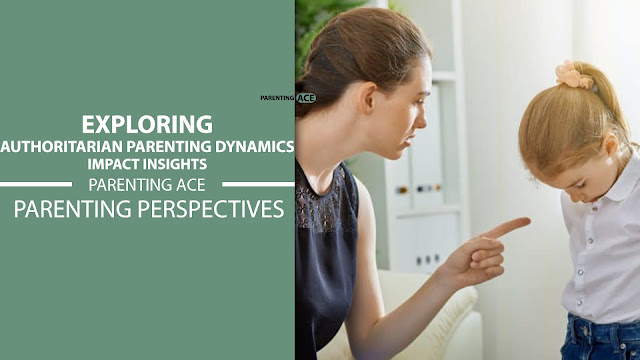Unveiling the Dynamics of Authoritarian Parenting: Understanding its Impact
In today's exploration, we delve into the intricate world of Authoritarian Parenting, a distinctive approach that shapes the upbringing of many children. Often characterized by strict rules, high expectations, and minimal flexibility, Authoritarian Parenting raises compelling questions about its effects on children's development and well-being. Join us as we navigate through the defining features, real-life examples, and profound impacts of this parenting style, shedding light on its complexities and offering insights into fostering healthier parent-child relationships.
 |
| Unveiling the Dynamics of Authoritarian Parenting: Understanding its Impact |
In the vast landscape of parenting styles, one approach stands out for its distinctive characteristics and profound impact on children's development: Authoritarian Parenting. Often marked by strict rules, high demands, and low responsiveness, this parenting style has garnered attention for its unique dynamics and outcomes. In this comprehensive exploration, we delve into the depths of Authoritarian Parenting, unraveling its defining features, providing real-life examples, and shedding light on its effects on children's growth and well-being.
Defining Authoritarian Parenting
At its core, Authoritarian Parenting is characterized by a high level of control and discipline coupled with low levels of warmth and responsiveness. In this parenting style, parents prioritize obedience and adherence to rules above all else, often resorting to harsh punishment or coercion to enforce compliance. Communication tends to be one-way, with little room for negotiation or explanation of rules. Authority is unquestionable, and children are expected to comply without question.
Real-life Examples
- Strict Enforcement of Rules: Imagine a household where strict rules govern every aspect of a child's life, from curfews to study schedules. Parents dictate the terms without considering their child's input or feelings. Failure to comply results in immediate consequences, such as loss of privileges or harsh punishment.
- Lack of Emotional Expression: In Authoritarian households, expressions of emotion are often discouraged or dismissed. Children may feel hesitant to express their thoughts, feelings, or concerns for fear of reprimand or judgment from their parents. Emotional needs take a backseat to obedience and compliance.
- Pressure to Excel: Authoritarian parents place a strong emphasis on academic or extracurricular achievement, expecting nothing less than perfection from their children. Failure to meet expectations can lead to feelings of inadequacy or unworthiness in children, as they strive to live up to impossibly high standards set by their parents.
Impact on Children's Development
While Authoritarian Parenting may yield immediate compliance, its long-term effects on children's development are often detrimental. Research suggests that children raised in Authoritarian households may experience:
- Low Self-esteem: Constant criticism and a lack of emotional support can erode a child's sense of self-worth, leading to feelings of inadequacy or inferiority.
- Poor Social Skills: Limited opportunities for autonomy and decision-making can hinder a child's social development, making it challenging for them to navigate interpersonal relationships outside the family unit.
- Rebellion or Resentment: As children grow older, they may rebel against the strict constraints imposed by Authoritarian parenting, seeking independence and autonomy outside the confines of their family environment.
- Difficulty in Coping with Adversity: Shielded from failure or adversity, children raised in Authoritarian households may struggle to cope with challenges or setbacks later in life, lacking the resilience and problem-solving skills necessary for success.
Authoritarian Parenting, with its emphasis on control and obedience, presents a complex dynamic within the realm of parenting. While it may offer a sense of structure and order in the short term, its long-term consequences on children's emotional well-being and development are undeniable. As parents, it is essential to strike a balance between setting boundaries and fostering independence, recognizing the importance of warmth, communication, and empathy in nurturing resilient and well-adjusted children. By understanding the dynamics of Authoritarian Parenting and its impact, we can strive to cultivate healthy and supportive environments that empower children to thrive and flourish. #ParentingPerspectives #ParentingPathways



Comments
Post a Comment